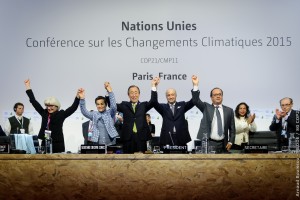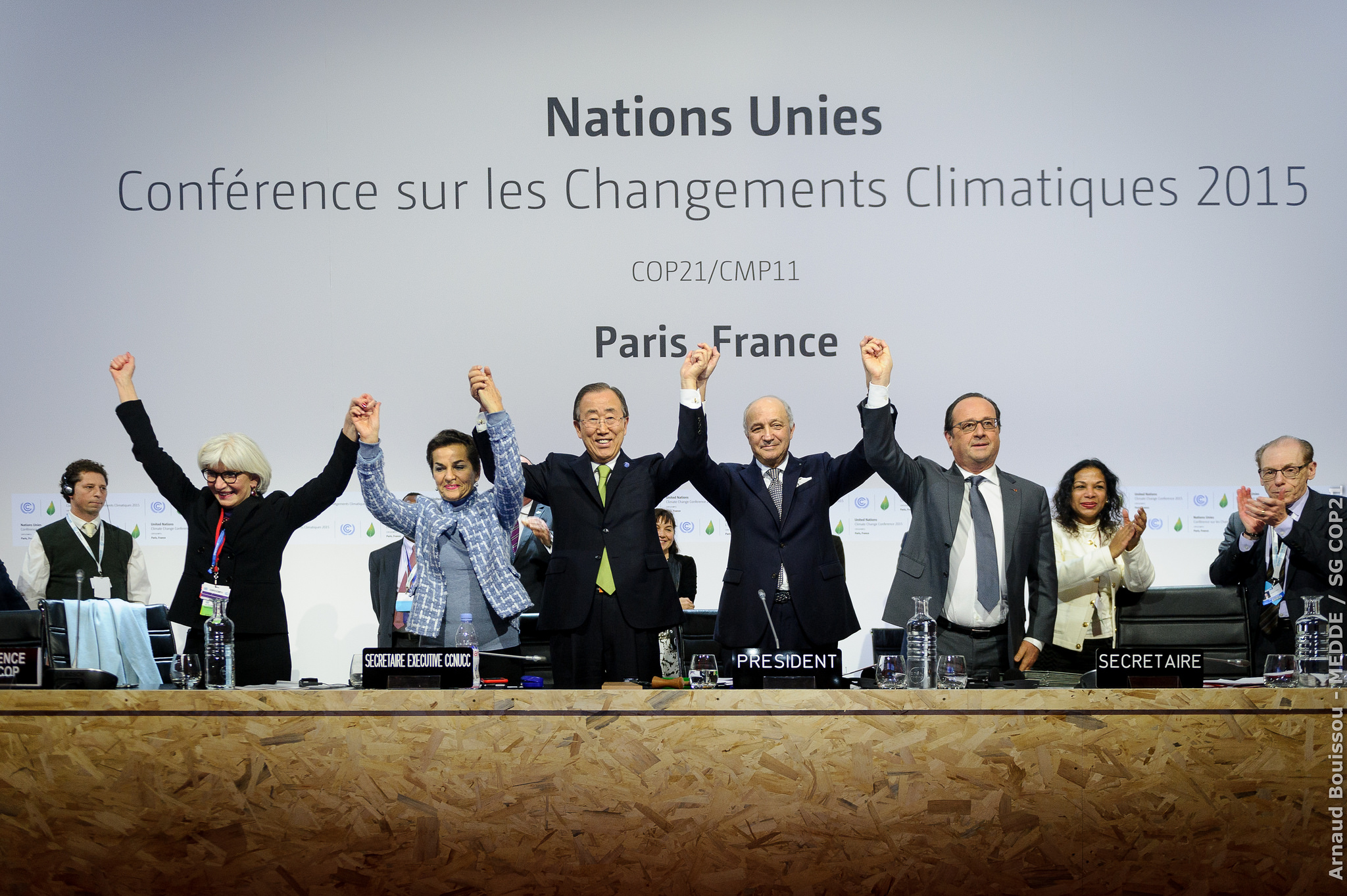L’Accord de Paris
 Watching live the concluding moment of the COP 21 in Paris was quite an emotional instant. The president of the COP Laurent Fabius was struggling to hold on to his professionalism and the excitement of UNFCCC Secretary General Christiana Figueres was very much transmittable. For a moment, one could almost fall for the romantic ideal of united countries overcoming their differences, moved by a common understanding and the need to work for the greater good.
Watching live the concluding moment of the COP 21 in Paris was quite an emotional instant. The president of the COP Laurent Fabius was struggling to hold on to his professionalism and the excitement of UNFCCC Secretary General Christiana Figueres was very much transmittable. For a moment, one could almost fall for the romantic ideal of united countries overcoming their differences, moved by a common understanding and the need to work for the greater good.
Many will argue that the treaty is too weak, too vague, not really legally binding, even though it is presented as such, that it stills need to be ratified, that by the time it is ratified, its significant content could be amputated, that 2020 is too late for it to come into effect, that the revision interval of 5 years is too long, that some critical targets were even suppressed from previous climate treaties… Sure. But the question is: do all these criticisms render the Accord de Paris worthless, ineffective, or even counterproductive, as some might postulate?
Only history will tell, but I don’t believe so. Without being naively optimistic, I see a success in this Accord.
It was a world diplomatic event. Looking only 20 years back, no one could have envisioned that in such a short period of time, climate change would achieve such mainstreamed importance. This may sound slow for some climate activists, but such a propagation in so many different societies is in fact stunningly fast. There is not one farmer in the most remote villages of Burkina Faso where I conduct my research who had not heard about climate change. In fact, being in the tropics they are sadly among the first observers of the effects of climate change.
The symbolic reach of this treaty will probably outpace its legal implications. But that’s fine. It gained considerable attention, and people’s opinion is a strong and feared force in our democratic epoch. Most great structural changes in our societies happened because of the public’s growing need or desire for a different structure. The legal frame to consolidate this then follows… sooner or later. The right question to ask is: will that be soon enough in this case?
Of course, environmental activists and scientists, much more aware of the stakes and potential dramatic consequences of climate change than the average citizen, might argue that this Accord is nothing but smoke and mirrors. But one has to consider the forces on the other side: oil producing countries and oil industries, large energy firms, specialized investment funds, all these oil-dependent conglomerates that associate the word decarbonisation with Armageddon and have successfully lobbied to have it not mentioned in the treaty. They are part of the world equation and any type of large-scale international agreement has to cope with their opinion and their interest, even if we don’t like it. This treaty is not especially a victory for them. And this is not even to mention the entire climate sceptic movement in the USA (see the following example of their falsely scientific presentations). These folks fight against any type of climate agreement that would limit the exploitation of oil and oil-related products upon which they depend. They too must be not so happy about this treaty. And that is a win.
 In the battle for climate agreement, the role of French diplomacy can be acknowledged for two reasons. Behind all the not necessarily unfair criticism of French foreign policy, few others would have brought so many to the table the way that they did and be “relatively” independent enough from the big powers to ensure the trust from smaller countries in the process. The second reason is the political advantage that the French government hoped to gain through a successful Accord de Paris. The ego of the French, always willing to make history, “faire l’Histoire” as they say, helped propel them to expend extra effort towards achieving a unanimously approved agreement. Pride and interest at the source of the success? Maybe, but in a way, it worked!
In the battle for climate agreement, the role of French diplomacy can be acknowledged for two reasons. Behind all the not necessarily unfair criticism of French foreign policy, few others would have brought so many to the table the way that they did and be “relatively” independent enough from the big powers to ensure the trust from smaller countries in the process. The second reason is the political advantage that the French government hoped to gain through a successful Accord de Paris. The ego of the French, always willing to make history, “faire l’Histoire” as they say, helped propel them to expend extra effort towards achieving a unanimously approved agreement. Pride and interest at the source of the success? Maybe, but in a way, it worked!
Here is the link to the pdf of the Accord de Paris.
—
Photos: Public Domain Dedication, licenced under CC-0 via flickr.



 You will not only read about my research but rather get to hear my voice talking all about our research with the Black Soldier Flies. I was the Ento Nation’s podcast guest this week and I enjoyed conversing with the Cricket Man….
You will not only read about my research but rather get to hear my voice talking all about our research with the Black Soldier Flies. I was the Ento Nation’s podcast guest this week and I enjoyed conversing with the Cricket Man….


 Click here for a full view of the EntoNation post on Marwa Shumo The EntoNation article Some info about Ento Nation: Your online resource for all things Ento. Bringing the benefits of bugs to people and planet. If you love bugs,…
Click here for a full view of the EntoNation post on Marwa Shumo The EntoNation article Some info about Ento Nation: Your online resource for all things Ento. Bringing the benefits of bugs to people and planet. If you love bugs,…
